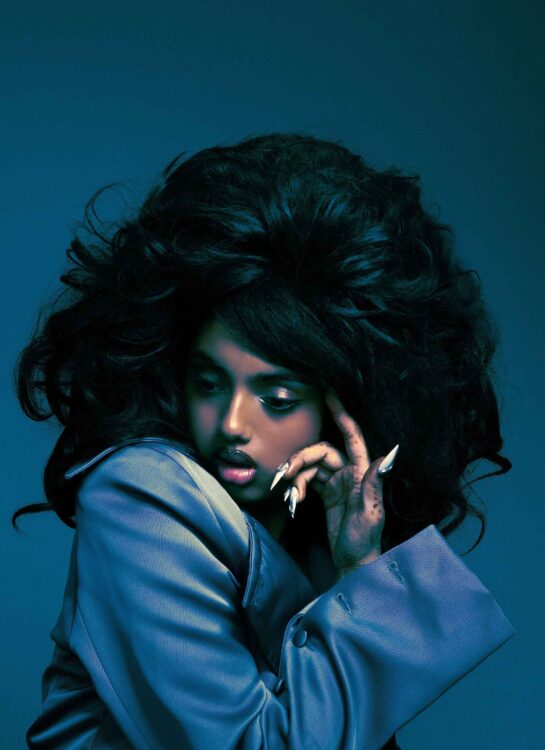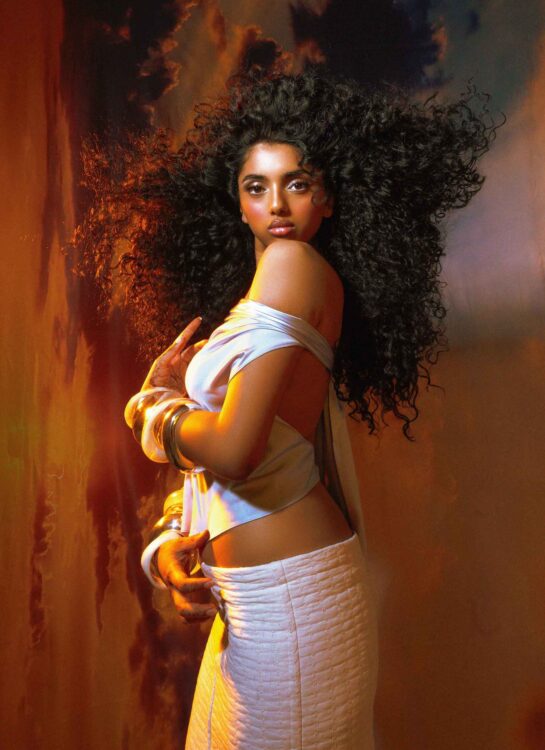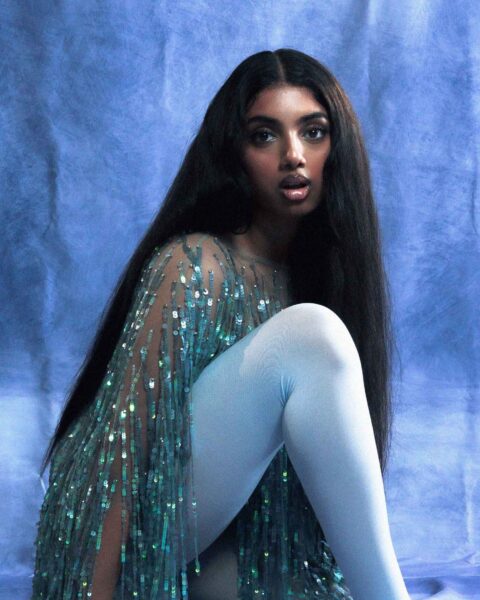- Words Kitty Robson
- Photographer, Creative Director and Producer Luke Stage
- Stylist Sionán
- Set Designer Devanté
- Hair Stylist Davey Matthew with The Only Agency using Bumble and Bumble
- Makeup Artist Kyle Sheehan
- Nail Artist Sydney Claire
- Photography Assistant Sam Berlin
- Lighting/Digi Tech Richard Saralertsophon
- Styling Assistant Nelly Delgado
- Hair Assistant Miguel Luis
From reinventing Karen in Mean Girls to straddling Hollywood and Bollywood, actress and artist Avantika is carving a career on her own terms.

Avantika isn’t interested in waiting for opportunities to come to her, she’s creating her own path. At just 20, the actress has already made her mark in Hollywood, catapulting onto our screens in the 2024 Mean Girls musical reboot as the scene-stealing Karen. Now, she’s moving seamlessly between continents, splitting her time between America and India as she lays the groundwork for a career in both industries. It’s a full-circle moment for the rising star, who began acting in Indian cinema as a child before stepping away as a teenager, only to return five years later, ready to take on leading roles.
That sense of reinvention runs through Avantika’s journey so far. A classically trained dancer turned actress, she grew up immersed in films that shaped her creative instincts, escaping into worlds and learning tricks of the trade. But as much as she loved the golden age of cinema, there was always something missing: “They’re these universal, wholesome stories, but they don’t star people who look like me,” she reflects in our interview with the rising star. That gap has fuelled her ambition, not just to be in the industry but to reshape it, to give the younger generation characters to watch and representation to look up to that she missed out on.


- Jacket Landeros
Avantika is keenly aware of the responsibility that comes with such visibility, from starring as a South Asian queer character in Big Girls Don’t Cry to producing and starring in an adaptation of A Crown of Wishes, she ensures her roles are as much about representation as they are about storytelling. And while she acknowledges the limitations of the industry, she’s not one to be confined by them.
Stepping into a new chapter after the breakout success of Mean Girls, for our new digital cover Avantika talks about her upcoming projects, her hopes for the industry, and navigating Hollywood, Bollywood, or the uncharted spaces in between.
What’s going on in your world right now?
The past few months I’ve been and forth from India quite a bit. My goal in my life when I turned 20 was to learn to navigate the Indian film industry. I worked in Indian cinema from when I was like from 10 to 15 and then left, because the way it works there, there aren’t really parts for you once you’re like 15 to like 20, they have to wait until you hit lead actress age. Now that I’ve hit that, I wanted to go back to lay the groundwork to have a career there as well. This year has been a lot of back and forth for that. It’s been five years since I’ve worked there and so it’s definitely a little bit of a culture shock for me, especially going back there as an adult but it’s been fun.
What are some of the differences between the film industry in India to what you’ve been used to in Hollywood?
The organisational structures are fundamentally very different between the way that American cinema works and the way Indian cinema works. In India, my mum is my manager, it almost feels more family style to be working over there. It is very much an industry you have to be proactive in, of course you have to work your butt off on set everywhere, but in India you have to reach out to like every single contact you know.
That must teach you a lot about the way it all works, is it fun to flex some new muscles?
Oh 100%! I’ve DMed people, emailed people and cold-called people myself and been like, ‘Hey, I’m interested in working with you. What’s the best way to get in touch?’ ‘Hey, I heard you have a new script, is there any way you can see me for it?’. There isn’t structurally a casting director, agent or manager system to go through, you do have to be really proactive there. The past five years I’ve been so used to the American way of doing things…

- Top Orseund Iris
- Skirt Dylan Reisner
- Clear bangles Alexis Bittar
- Silver & Beige Bangles Dinosaur Designs

Rewinding to the beginning, you started acting when you were very young. Tell me a bit about that and what creativity you were surrounded by growing up?
I grew up as a dancer and segued into acting, which felt quite natural. Neither of my parents were in the film industry or creative by profession – my dad is a software engineer and my mum is an accountant – but my dad is a massive movie buff and my mom grew up as a dancer and a model. They could always see the value in being creative, so they were very supportive when I said that I wanted to do something creative for my profession. Obviously, as goes with Indian parents, they wanted to make sure that all my bases were covered so there was also a big emphasis placed on my education when I was younger. Up until 11 or so my dream was to be a professional ballerina before realising it wasn’t the right world for me, so I joined a theatre school and fell in love with it. At the time, there was so little representation of Indians on screen in Hollywood or brown people in general, so my mom was though why don’t we try and film industry first? Let’s let the industry catch up a little bit here.
Do you remember which movies that had an impact on you at that time? Were there films that felt pivotal in terms of what they taught you about acting and making movies?
Oh one hundred percent. The Wizard of Oz is one of my favourite movie of all time. Matilda and The Sound of Music too. I think like watching all these movies that are so rich and beautiful, not just in their characters and their stories, but also visually. Technicolor movies like Oz and films shot on 60mm like The Sound of Music. I remember thinking I would kill to make something like this or be in something like this right now. Matilda meant a lot as when I was in school, I did not get a lot of support from my teachers. This changed once I got into high school, but in elementary school a teacher like Miss Honey was such a foreign thing to me. So these films were all really gorgeous escapes for me and my parents really recognised that: they showed me all of these films when I was quite young and we had them on DVD so I just watched them again and again and again. They are these universal, wholesome stories, but they don’t star people who look like me and so there’s always this small part of you that aspires for that and wants to be a part of that. I think those three movies especially really set in stone my love for cinema.
Music is a powerful through-line with those three films as well, which feels relevant to you now!
You’re right, yeah! My parents played a lot of movies at home, but we weren’t much of a music household. A lot of kids will be like, ‘oh our parents had the radio on and Billy Joel playing on vinyl’… For me, my parents always a movie running in the background. And so I think my source of music then, and my love of music now, very much stems from movie soundtracks or musicals or the style of music that was featured in those old movies.
Speaking of musicals, tell me a bit about Mean Girls! How did you approach reimagining Karen in your own way?
I think when a movie is that iconic and that memorable, when you are reading the lines you’re thinking of the original. When I first read the script, Amanda Seyfried’s delivery was stuck in my head. I didn’t want to steer too much away from the original, I wanted to honour that. Our production, directors [Samantha Jayne and Arturo Perez Jr.] and writer Tina Fey let us have so much input into characters. Like the way that they dressed, even, I remember them just opening up the racks to me one day and being like, ‘Pick out your outfit for the day’. It was so open and personal. From navigating how to walk as the character or how to do my hair, how to speak, there was such an effort from the production side to create a new version of her that was set aside from the original. I think by virtue of it being a musical too, there’s always a level of natural drama, exaggeration and hyperbole added to the characters that wouldn’t be in a non-musical film. The song sequence for ‘Sexy’ helped me get into it, it kind of lends itself to a new version. So I would give a lot of that credit to production, to Tina Fey and her script itself.
How did it feel as a South Asian actress to be stepping into that movie and that role? Into the realm of these classic films you talked about earlier, which were once predominantly white?
Kind of unreal, honestly. I remember when I submitted my audition, I literally closed my laptop and thought ‘Well we’re never hearing back from that again’. I didn’t hear back for six months and then they were like, ‘The offer’s in your email’. I say this a lot in regards to Mean Girls, that the movie never really felt real just because the process was so unorthodox. It never really landed to me that this was something that I was doing until I was on set and into day one of shooting. I think the hesitation and the fear of reprising this role that was so iconic, that iconic women had played before me, that fear dissipated within the first week. It was really comfortable to be around all my friends – Reneé Rapp, Angourie Rice, Auli’i Cravalho and Bebe Woods and everyone – to just let loose and play, have fun and sing. Mean Girls was such a big deal but I just didn’t think that many people would watch it, we had just come out of the whole post-COVID movie decline and so I’d kind of prepared myself to think ‘not a lot of people are gonna see this, people aren’t that interested in movies again yet, it’s gonna take a little bit more time’. But the reality of it hit after, I realised I’d got to play a crazy amazing character in the zeitgeist. It landed to me post-release, post all the acknowledgement. I was like, ‘Oh, you know what this is pretty fucking cool’ about two months after the movie came out.
Where do you feel like it has led you to next? Where do you want to go after having that experience?
I think it really kickstarted my career in the entertainment industry: after that movie people knew I existed, people were willing to give me a chance, willing to let me audition for parts that I never would’ve been able to go in for before. I was allowed to step into a room where the doors would’ve never opened for me before. The movie gained so much traction, even in India so it truly did for me as much as I could have wanted it to do. It brought me a lot of confidence in terms of doing comedy as a genre: I was always very nervous about doing comedy just because you’re like ‘Are people gonna laugh?!’ That question is still so intimidating, but the movie gave me more assurance in that. But yeah, it’s opened doors for me, I have a movie coming out in the summer called Ballerina Overdrive, which I star in with Uma Thurman, Maddie Ziegler, Lana Condor, Iris Apatow and Millicent Simmons. It’s a really great action thriller about a few ballerinas who get hunted down by the mafia. The creatives behind it had watched Mean Girls, and I’m so excited to be a part of it.

- Dress Emma Joan Foley
- Shoes Melitta Baumeister

What can we expect from Ballerina Overdrive and from your role?
It is just such a cool movie, I haven’t seen the finished film yet, but I’ve like seen clips and I’m genuinely so excited for people to see it. I think it’s a movie that doesn’t exist yet: it’s fun, campy, filled with action and filled with like so many names people grew up with. A lot of my generation grew up watching Lana inTo All the Boys I’ve Loved Before. We grew up watching Maddie on Dance Moms. And we grew up watching Uma Thurman, of course! It’s such a cool collection of people. And I was really excited to tap back into ballet after so many years!
How was it getting back into your childhood dream of being a ballerina?
I definitely was a little bit rusty! Maddie and Lana are incredible ballerinas so it was a little nerve-wracking, but we were all dusting off our shoes and so it felt really good to be doing it with everyone, that reduced some of the intimidation and fear. But we just trained our asses off, we got to do some action stuff, we boxed, kicked and did all of that cool stuff. I’m excited for people to see the ballet and fight choreography: I think it’s really special.
Your film choices so far really seem to blend playfulness with complexity. What’s your dream role or what would you love to try next?
I’d love to do something super, super action. I love movement and I’ve always loved movement, so anything in that space is interesting to me. Then I would love to also do something more serious, more drama and more toned down. I feel like it’s important to see representation in the big campy life-size movies and characters, but also in the really rooted and grounded stories. I would love to be a part of something like that, to tell a story that feels really true to home or true to self.


Talk to me a bit about Big Girls Don’t Cry. What drew you to Leah’s story, and how important was it for you to play a South Asian LGBTQ+ character?
It was really, really fun. I’ve made some of my best friends on that production and it was my first time working in India since I was around 15. That was my first ever project in Hindi, up until that point I had only really worked in Bengali films, which is the South Indian film industry. That was my first time working in proper Bollywood. I think there’s always a certain level of fear of how a character is going to be received, but people were so loving and so supportive. Unfortunately, the show didn’t get picked up for a second season, but I think this first season reached a lot of people. Young girls in villages and rural areas watched it, reached out to all of us and felt so inspired. I think at the end of the day when you make a show like this that takes a risk, the greatest gift is even one person just saying thank you for making this, thank you for showing people that girls like us exist and for telling our stories.
Definitely, that must be so moving. It’s a difficult and complicated time in America right now, it must feel important in many ways to be a part of making art and expanding people’s perspectives. Does there feel like a responsibility in that way?
Yeah, there does feel like a responsibility. There also feels like a level of helplessness. We’re kind of at the whims of studios, corporate and the political climate at the end of the day. We are delivering the stories that we’re allowed to deliver. But I think it’s so important to come out of that headspace and realise that you do have power. The people around me, my team, are very supportive. I produced when I was younger, and I sold something to Disney but haven’t really gone into the production side since then, but I would love to. It’s in times like these where it’s important to remember that you have that capability as an actor, that you can produce and that you can write your own stories. And yes, it’s a new muscle that you have to exercise, it’s a new thing you have to learn. But that passion and drive to make a difference through art is really what using your voice is about. I think it’s about prioritising art over perfectionism. Writing, speaking out, producing, vouching for scripts and books that you think are valuable and are important, over like, ‘do I think this is worth me putting on my resume?’ Or ‘do I think this is worth me endorsing it?’ To ignore that, to place a higher priority on just speaking and to just creating, is an important thing. I’ve been trying to remember that throughout this, because that’s really all I can do.
Follow Avantika on Instagram here and stay tuned for Ballerina Overdrive, in cinemas soon.







